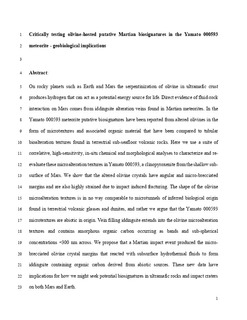Critically testing olivine-hosted putative martian biosignatures in the Yamato 000593 meteorite - Geobiological implications
McLoughlin, Nicola; Grosch, Eugene Gerald; Vullum, Per Erik; Guagliardo, Paul; Saunders, Martin; Wacey, David
Journal article, Peer reviewed
Accepted version

View/
Date
2019Metadata
Show full item recordCollections
- Institutt for fysikk [2701]
- Publikasjoner fra CRIStin - NTNU [38525]
Original version
10.1111/gbi.12361Abstract
On rocky planets such as Earth and Mars the serpentinization of olivine in ultramafic crust produces hydrogen that can act as a potential energy source for life. Direct evidence of fluid–rock interaction on Mars comes from iddingsite alteration veins found in martian meteorites. In the Yamato 000593 meteorite, putative biosignatures have been reported from altered olivines in the form of microtextures and associated organic material that have been compared to tubular bioalteration textures found in terrestrial sub‐seafloor volcanic rocks. Here, we use a suite of correlative, high‐sensitivity, in situ chemical, and morphological analyses to characterize and re‐evaluate these microalteration textures in Yamato 000593, a clinopyroxenite from the shallow subsurface of Mars. We show that the altered olivine crystals have angular and micro‐brecciated margins and are also highly strained due to impact‐induced fracturing. The shape of the olivine microalteration textures is in no way comparable to microtunnels of inferred biological origin found in terrestrial volcanic glasses and dunites, and rather we argue that the Yamato 000593 microtextures are abiotic in origin. Vein filling iddingsite extends into the olivine microalteration textures and contains amorphous organic carbon occurring as bands and sub‐spherical concentrations <300 nm across. We propose that a martian impact event produced the micro‐brecciated olivine crystal margins that reacted with subsurface hydrothermal fluids to form iddingsite containing organic carbon derived from abiotic sources. These new data have implications for how we might seek potential biosignatures in ultramafic rocks and impact craters on both Mars and Earth. Critically testing olivine-hosted putative martian biosignatures in the Yamato 000593 meteorite - Geobiological implications